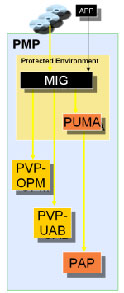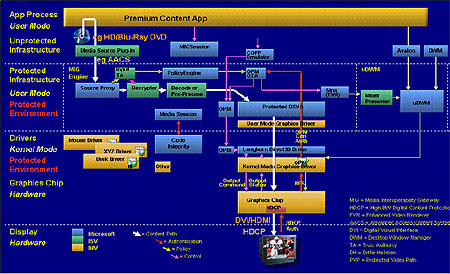The features of the OCPM suite are as follows:
 The
Windows Vista PMP (Protected Media Path) and PE (Protected
Environment)
The
Windows Vista PMP (Protected Media Path) and PE (Protected
Environment)
The PMP is Microsoft's assurance
to content providers that their 'premium' content will be safe from illegal duplication
when played on Windows Vista. The basic building block for this is
the Vista PE (Protected Environment). The Vista PE is
a system state that allows a Windows Vista computer to play
what Microsoft refers to as 'premium content'.
The PE is built on certified hardware using certified drivers, and can be
invalidated by the presence of 'un-trusted' software, drivers or hardware. What
constitutes unsafe software will likely be decided by Microsoft and concerned
interests like the RIAA and movie industries.
The Microsoft Vista operating system will check its hardware and drivers
upon startup to establish that all components meet with current Protected Environment requirements. It will
then periodically re-check the system state as protected media is played, to ensure that
nothing has changed.
The introduction of invalid software, hardware or drivers will either be
blocked by the PE or, more likely, cause the PE to be removed. This will disable
or reduce the quality of protected media playback, but will have no other effect
on the computer's operations.
Let's take a look at the four components which make up the OCMP suite and the Vista
Protected Environment. Note that of these, only the first two, PVP-OPM
and PVP-UAB are intended to be fully implemented in Microsoft Vista upon
release.
The Protected Standards Emerge
Protected Video Path - PVP-OPM- Output
Protection Management is the main feature of the OCPM suite and the one that has
drawn the most negative attention so far. It provides Windows Vista with the
ability to disable DVI/HDMI and TV-outputs
unless they are certified for HDCP and Macrovision/CGMS-A
respectively. This is intended to ensure that it is not possible to
capture an unencrypted video signal from these ports. Support for PVP-OPM
also mandates that video card VGA output also include a 'constrictor' feature to
downsample HD video content if HDCP support is not present in the attached
monitor.

A series of identifying checks will be performed on the drivers and the
hardware at startup to verify that they are approved to operate under PVP-OPM.
This establishes a 'safe state' for protected content to be played.
If this state is not reached, attempts to play protected media over DVI or
TV-output will result in either failure or a reduced quality image.
Interestingly, HDCP cannot be enabled on component outputs. This has
implications that reach a lot further than the scope of this article, but for
the purposes of PVP-OPM, component outputs will always be either disabled or
have their signals constricted. This is sure to displease owners of
current generation ATI and nVidia video cards which feature component outputs
for HD TV watching. If HDCP takes off, the death of component outputs
(already in the cards because of DVI) will be hastened, especially in the
computer market.
